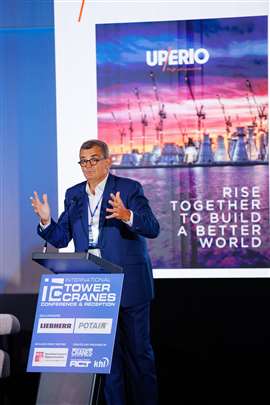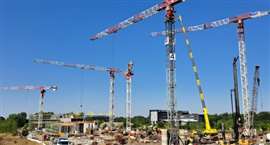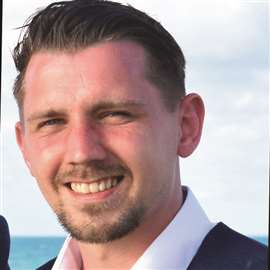Read this article in French German Italian Portuguese Spanish
Uperio founder: How ESG commitments can boost rental profits for tower cranes
25 July 2025
To Philippe Cohet, president of the French rental association DLR and founder of tower crane rental specialist Uperio, cranes are “the Ferraris of the jobsite.” And yet, he says, these vast pieces of equipment end up renting out at lower rates than other construction machinery. In a keynote presentation to the International Tower Cranes conference last month, he argued crane rental firms should leverage the long lifespans of their equipment to reposition the way crane services are marketed and priced. Alex Dahm reports.
 Philippe Cohet, Uperio founder and board vice chairman, speaking at the 2025 ITC conference in Rome, Italy. Photo: Joe Mather/KHL Group
Philippe Cohet, Uperio founder and board vice chairman, speaking at the 2025 ITC conference in Rome, Italy. Photo: Joe Mather/KHL Group
The tower crane industry must urgently address a disconnect between the essential services it provides and the limited financial returns it generates, said Philippe Cohet, president of the French rental association DLR and founder of tower crane rental specialist Uperio.
Speaking at the International Tower Cranes (ITC) conference in Rome, Cohet warned that the industry risks falling behind if it fails to capitalise on the long-term value of its equipment and embrace circular economy principles.
“When I compare the kind of value created by other equipment versus tower cranes there is a problem here,” he told delegates. “We don’t make the same amount of money that the other people are doing with all their other equipment.
And at the same time those people are saying tower cranes – you are a unique product, you are very special. You are like the Ferrari of the equipment in the jobsite.”
“We clearly have a paradox here in that we are perceived as being the people providing a unique kind of service, but we don’t make the same return,” he added.
“Ferraris” of the jobsite
Tower cranes, often the most high-profile and high value equipment to be used on construction sites, operate under ownership and rental models that demand long-term strategic thinking and significant capital outlay.
Cohet argued that one of the key ways in which tower crane rental businesses should seek to enhance their profiles and their bottom lines is by leveraging their long-life cycle.
While other equipment is replaced or upgraded frequently, tower cranes can remain serviceable for decades, opening up possibilities for a deeper exploration of circular economy principles. The tower crane business is very long term.
The assets have value for many years – way longer than most other construction equipment. This is where the sustainability element can be fully explored for the future.
 Uperio flat top tower cranes (Terex CTT 331 and CTT 332) at work on a project in Dortmund, Germany. Photo: Uperio
Uperio flat top tower cranes (Terex CTT 331 and CTT 332) at work on a project in Dortmund, Germany. Photo: Uperio
Cohet argued that circularity should not be viewed as a cost, but as a business differentiator.
With investors increasingly demanding evidence of ESG (environmental, social, and governance) performance, and contractors under pressure to deliver lower-carbon construction, tower crane providers can become critical enablers of greener projects.
“The crane itself is not just a piece of steel – it’s a service, it’s logistics, it’s planning,” said Cohet.
“If we position it right, and build in sustainability, we offer more than just lifting. We offer value.”
Underlying Cohet’s comments was a broader appeal for a more enlightened approach to financing in the tower crane sector.
At present, he suggested, the asset-heavy, capital-intensive nature of the business can be a barrier to attracting investment – particularly when margins are slim and asset turnover is slow. But with the right framework in place, this could change.
“The long life of our assets can actually be an advantage,” Cohet argued. “If we can prove that a crane will work for 20 or even 30 years – and that it will be reused, refurbished, and recycled responsibly – then we can make a much stronger investment case.”
Uperio, one of Europe’s largest crane rental and service companies, also manufactures Arcomet self erecting tower cranes and the Opti crane for contractors, roofers and carpenters.
It has facilities in nine countries employing more than 600 people and operates a fleet of around 2,200 tower cranes.
Cohet said the company has spent years developing a sustainability strategy that promotes the sustainability benefits of tower cranes to customers, lenders, investors and regulators.
This strategy involves far more than just new equipment or greener operations, he said. It means embracing circularity at every level – design, maintenance, reuse, refurbishment, and ultimately resale.
Uperio’s fleet strategy increasingly focuses on extending asset life through rigorous maintenance, modular refurbishment, and efficient redeployment of cranes between projects.
The company is working with financial partners to explore new leasing and asset management models that better reflect the long-term utility and sustainability of cranes.
The company is also actively engaged with manufacturers and regulators to push for more standardisation in refurbishment practices and lifecycle tracking.
New leasing and asset management models
Uperio is also exploring digital tools to track and optimise crane usage over time, using data not only to improve efficiency but to build a sustainability case for investors and clients.
This positioning could require a shift in the way crane services are marketed and priced.
Rather than competing solely on hourly rental rates, crane rental companies are looking to shift toward performance-based models that capture the broader value provided – especially in terms of productivity gains, reduced emissions, and reduced material waste.
Despite the optimism, Cohet was clear that no single company can achieve the shift alone. Collaboration across the tower crane industry – including manufacturers, rental companies, contractors, and clients – is essential to building a truly circular and sustainable model.
“If we want better returns, if we want to be part of the sustainability solution, we need to invest, not just in machines but in systems, data, and partnerships,” he added.
STAY CONNECTED



Receive the information you need when you need it through our world-leading magazines, newsletters and daily briefings.
CONNECT WITH THE TEAM









